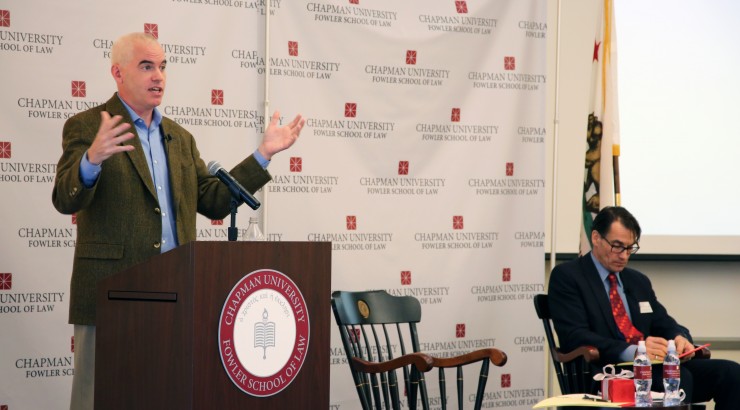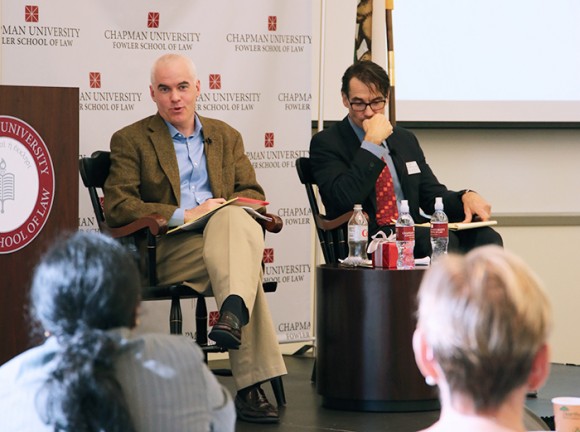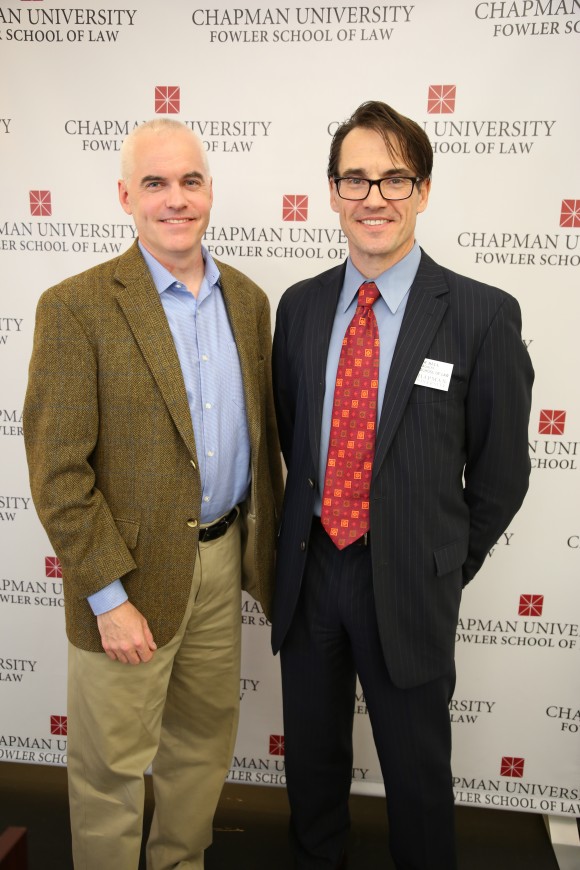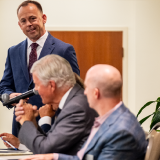
Fowler School of Law Welcomes Dean James Gibson for Chapman Dialogue entitled “Relying on Reputation”
November 23, 2015
On November 16, Chapman University Dale E. Fowler School of Law welcomed James Gibson, Associate Dean for Academic Affairs and Professor of Law at the University of Richmond School of Law, to deliver the final 2015 installment in the Chapman Dialogue Lecture Series. His presentation, entitled “Relying on Reputation,” was followed by a discussion with Fowler School of Law Professor Tom W. Bell.

Dean Gibson’s presentation evaluated the means by which reputational metrics are produced and created. He also analyzed when and whether reputation should be valued and give rise to protected rights and exclusivity concerns in the law. Dean Gibson worked from a premise that accurate reputation is a good that society generally wants produced and wants available to the consuming public to evaluate firms and their products. Dean Gibson surveyed a variety of means of production of reputation – from both consumer-generated and firm-generated inputs into the market for information – and asked whether these means are likely to provide accurate and available information. Dean Gibson was skeptical about this market for such reputational information, concluding that accurate reputational information is likely grossly under-produced.
After dissecting the microeconomics behind the production of accurate reputational information, Dean Gibson proceeded to discuss implications for several areas of law. In contracts, for example, Dean Gibson questioned whether the reputation-as-constraint theory for enforcing terms of use provides a legitimate justification for enforcing boilerplate contracts. If negative reputational consequences have a low likelihood of occurrence in the event of enforcement of draconian contract terms because reputational information is so regularly under-produced and under-accessible, he expressed concern over whether reputation actually operates as a constraint. Dean Gibson also criticized trademark law’s over-protection of reputation
qua
reputation, such as in trademark dilution cases, because it makes what he believes are unwarranted assumptions about the value of reputation in a marketplace that does not produce an optimal amount of accurate reputational information in the first place. Dean Gibson concluded his fascinating review and analysis by pointing out that reputation is done right and worth relying on in defamation law, precisely because that area of law values and protects truth and inherently includes a mechanism for giving reputation force when it reflects truth.
View the webcast of the Dialogue with Dean Gibson
.
See the full 2015-2016 Chapman Dialogue schedule.
James Gibson is the Associate Dean for Academic Affairs and a Professor of Law at the University of Richmond School of Law. He teaches and writes in the areas of intellectual property, contracts, as well as law and technology. He is also founder and former director of the Richmond School of Law’s Intellectual Property Institute. His scholarship has appeared in the
Yale Law Journal
,
Virginia Law Review
,
Texas Law Review
, and
UCLA Law Review
, among other venues. Dean Gibson is also a frequent commentator in the media and has been quoted in the
New York Times
,
Wall Street Journal
,
National Law Journal
,
Slate
and
Chronicle of Higher Education
. He has been a visiting professor at the University of Virginia School of Law and is a recipient of the University of Richmond’s 2007 Distinguished Educator Award.
Dean Gibson received his JD from the University of Virginia School of Law and his B.A.
cum laude
in political science from Yale University. While at the University of Virginia, he served as an Editor of the
Virginia Law Review
. After graduation, he clerked for Judge Karen Nelson Moore of the United States Court of Appeal for the Sixth Circuit.
About the Chapman Dialogue Lecture Series
The Chapman Dialogue Lecture Series is a special lineup of distinguished lectures by innovative and thought-provoking legal scholars as well as some of the nation’s most prominent legal practitioners. Invited speakers present their research and ideas to a wide audience of faculty, students, alumni and special guests. Each Dialogue concludes with a lively Question and Answer session, typically led by one or two discussants from among the Fowler School of Law faculty.

